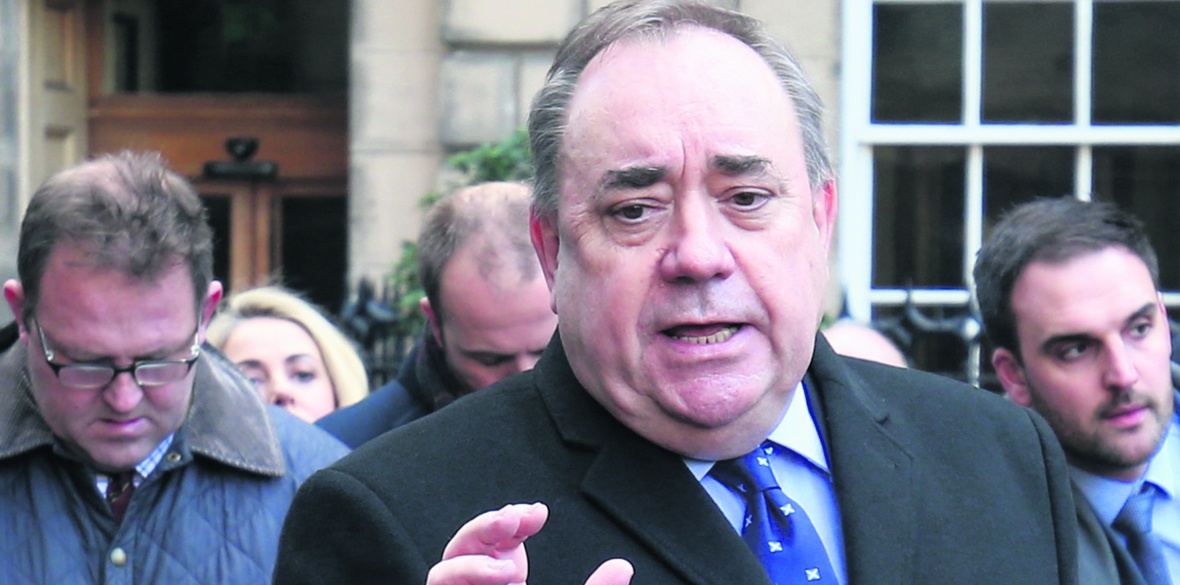This is the last article you can read this month
You can read more article this month
You can read more articles this month
Sorry your limit is up for this month
Reset on:
Please help support the Morning Star by subscribing here
I’VE never seen the meeting room so packed out for the post-First Minister’s Questions government briefing as it was on Thursday.
With FMQs dominated by Nicola Sturgeon’s meetings with her predecessor Alex Salmond, at which they discussed the allegations of sexual misconduct which the latter strongly denies, you’d think it would have all been said already.
But questions remained — and still remain — unanswered.
The latest controversy surrounds these three meetings and two phone calls between Sturgeon and her predecessor.
According to the FM, it was in April that Salmond first informed her of the two complaints made against him to the Scottish government. The meeting took place at her house.
Despite the meeting being arranged and attended by Sturgeon’s chief of staff Liz Lloyd, a Scottish government employee, team Sturgeon continues to insist it was not a government meeting — but a party one.
Salmond did not hold elected office at the time, the FM’s spokesman explained on Thursday, but he was still an SNP member.
He was, however, a former first minister of the Scottish government, and it was in this capacity he was being investigated — by the very same Scottish government.
And no officials of the party, other than Sturgeon as its leader, were made aware of the meeting. Sturgeon has said her husband Peter Murrell, the SNP’s chief executive, was out at the time.
While he became aware of Salmond’s visit, Sturgeon says she did not discuss the meeting’s contents with him.
Perhaps officials believe that designating the visit to be a party meeting justifies the lack of minutes, and the fact that it was kept a secret from the Civil Service.
The Scottish ministerial code, however, states that when ministers “find themselves discussing official business” with external parties “without an official present,” then “any significant content” should be reported back to their private offices “who should arrange for the basic facts of such meetings to be recorded.”
This did not happen — which is why Labour’s Richard Leonard says Sturgeon should now refer herself to a parliamentary watchdog for a breach. Sturgeon denies she has breached the code.
Then there is the question of why Sturgeon continued discussing the matter with Salmond on so many subsequent occasions — despite claiming that she made it clear from the off that she was staying out of it.
On Thursday, her spokesman said that the FM used the second meeting, which took place in Aberdeen ahead of the SNP’s conference in June, to “reiterate” she would not get involved.
Why, I asked him, did she feel the need to do so? Did she think she hadn’t made it clear the first time round? She *had* made it clear the first time round, the spokesman insisted, suggesting Sturgeon believed the point couldn’t be stressed hard enough.
Yesterday, Scottish Tory acting leader Jackson Carlaw posed some pertinent questions about the third “Saturday summit” meeting, which took place at Sturgeon’s Glasgow home in July.
“She can’t claim she was ambushed by Mr Salmond,” Carlaw said. “They’d already spoken three times at this point. So why did she hold this meeting?"
“What did Mr Salmond tell Ms Sturgeon about the investigation? What involvement did she, or any of her aides, have at this time?”
There’s part of me that winces when issues like this become entangled in the minutiae of procedure and internal government machinations.
We must not forget that at the centre of this case are two women who have come forward with very serious allegations. A police investigation is still under way.
But let’s not forget either that it was a “procedural flaw” which this week derailed the Scottish government’s investigation into these allegations, after successful legal action by Salmond.
The government must act to ensure there are no flaws in its procedures so the processes of its complaints system are not obstructed.
It owes this not just to the complainants in this case, but to all its workers. It was welcome that Permanent Secretary Leslie Evans met Civil Service unions this week, and that PCS Scottish official Lynn Henderson spoke out to “reassure our members who may be worried about using the current procedure that we believe it remains an appropriate way of ensuring the Scottish government is a safe and dignified place to work.”
But ministers too have procedures to follow — set out in the ministerial code Sturgeon is now accused of breaching.
And if the First Minister can’t keep to the book over such a severe case, what confidence does that instil in her government to deal with it properly and sensitively?











